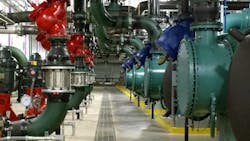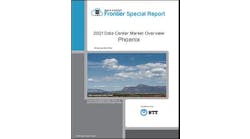Developer DuPont Fabros Technology (DFT) has been a pioneer in massive “super wholesale” data center leases. The company has just signed its largest deal yet, pre-leasing 28.8 megawatts of data center space across two major markets. The leases will fill all the first phase of the company’s CH3 data center in suburban Chicago, as well as the first two phases of its new ACC9 facility in Ashburn, Virginia.
The massive deal demonstrates that last year’s unprecedented leasing by hyperscale cloud service providers was not a one-time event. DFT’s largest previous lease had been a 16 megawatt deal in early 2016 for the entire Phase III of its facility in Santa Clara, Calif.
DuPont Fabros declined to identify the customer by name, as is company policy. But its description of the deal suggests the customer may be Apple, which has accelerated the expansion of its Internet infrastructure over the past year.
Back to Construction Mode
The huge lease represented the bulk of DFT’s 34.2 megawatts of leasing thus far in 2017, underscoring the strong demand for wholesale data center space in Northern Virginia and Chicago. The massive pre-leasing deal spanned three leases in two markets:
- A pre-lease for the full 14.4 megawatts of critical load in the first phase of CH3, the new DFT data center in the Chicago suburb of Elk Grove Village, which will be delivered in the first quarter of 2018.
- A pre-lease for 7.2 megawatts at ACC9 Phase I, the newest DFT data center in Ashburn, which will commence on May 1.
- A pre-lease for 7.2 megawatts at ACC9 Phase II, to be delivered in the third quarter of 2017, when the phase is scheduled to open.
In a sign of the strength of hyperscale demand in the Ashburn market, DuPont Fabros said it is holding the remaining 14.4 megawatts of capacity within ACC9 for existing clients, and will immediately start construction on phase I of ACC10, the next data center on its massive Ashburn Corporate Center campus in Ashburn. The project will be a 15 megawatt phase and is expected to be completed in the second quarter of 2018.
CEO Chris Eldredge says that although leases haven’t yet been signed for the balance of ACC9, conversations with customers give the company a high degree of confidence.
An aerial view of the ACC9 data center, part of DuPont Fabros’ Ashburn campus. (Photo: DFT)
“Most of that capacity is being held for customers,” said Eldredge. “It’s a strategic customer, and it’s not just one.”
Northern Virginia houses infrastructure supporting public clouds operated by Amazon, Microsoft, Google and Oracle, as well as hyperscale players like Facebook and Apple and data-driven companies Uber, LinkedIn and Dropbox.
The Chicago region has also become a favored location for hosting, colocation and cloud computing companies, especially in the western suburbs near O’Hare Airport, which offers room for the larger footprints that are difficult to find in downtown Chicago.
DFT will also begin building the second phase of CH3, a 12.8 megawatt project that’s also scheduled for completion in the second quarter of 2018. During the first quarter, DuPont Fabros also signed a 1.4 megawatt lease for the remaining space in its CH2 facility, as well as a 4.2 megawatt deal for the last chunk of space available in its ACC7 data center in Ashburn.
“When you lease 28.8 megawatts of capacity, obviously, there’s a replenishing phase with any type of funnel,” said Eldredge. “But we’re very, very pleased with our sales funnel and our current pipeline.”
Signs Point to Apple
On Thursday’s call with investors, DFT executives said the huge lease was signed with the company’s third-largest customer, which is identified only as a “Fortune 25 Investment Grade Rated Company” in the company’s report. That sounds like Apple, which is known to lease space in the company’s facilities in Santa Clara and Chicago campuses. DuPont Fabros has only two tenants among the Fortune 25: Apple and Microsoft, which is DFT’s largest tenant.
“We have a tremendous relationship with this customer,” said Eldredge. “They value our operations team, they value the things that we do for them. We think this customer has tremendous potential to expand with us in some of our new developments. I can tell you that it’s not one of the three large hyperscale providers” (presumably Google, Microsoft and Amazon Web Services).
Apple is expanding its data center footprint to support its iTunes and iCloud products, adding capacity at its data center campuses in Nevada, Oregon and North Carolina, as well as building a facility in Denmark. A project planned for Galway, Ireland has been held up by regulatory reviews.
But even as it builds data centers in some markets, it continues to lease third-party colocation and wholesale data center space in other sites, including Santa Clara, Chicago and Ashburn.
Data Center Knowledge recently reported that the amount of energy Apple used in third-party data centers has quadrupled over the last four years, going from about 38,550 MWh total in fiscal year 2012 to more than 180,200 MWh in fiscal 2016, according to Apple company reports. Apple’s leased footprint now consumes close to one-quarter of its total data center energy consumption.






